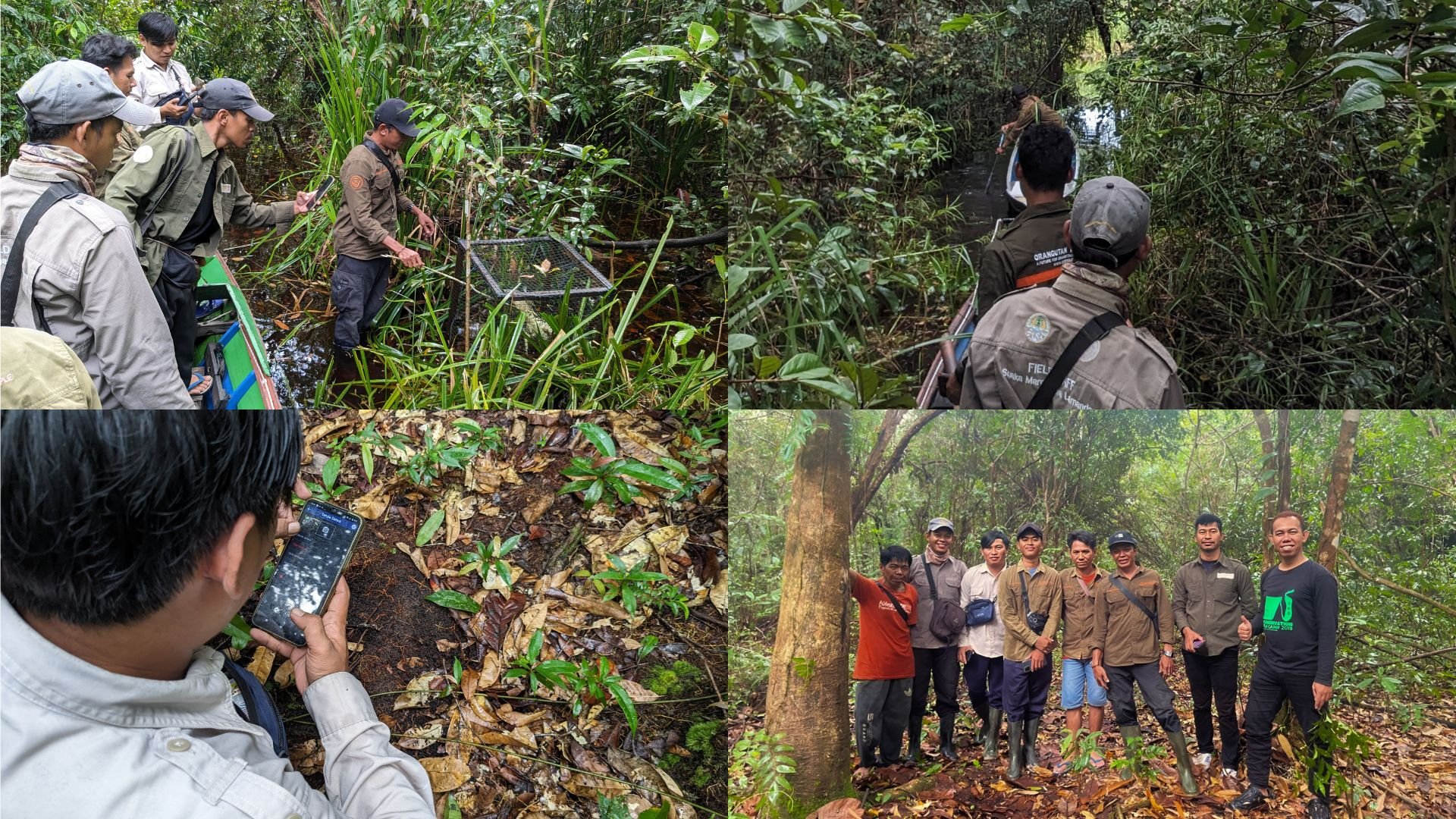WORKSHOPS & FIELD TRAINING
To learn and improve the skills of both staff members and stakeholders we regularly run workshops and training related to our work for orangutans, forests and people.
Check out our recent workshops and training below:
MAY
Training on human-orangutan conflict mitigation with farmer groups
Earlier this year, we supported BKSDA in conducting training on how to mitigate orangutan conflict with humans, involving farmers and communities around oil palm plantation villages.
A conflict mitigation presentation included the ‘Regulations and Protection of Wild Plants and Animals’, how to handle conflicts between humans and wild animals, and how to expel or rescue orangutans. All participants were invited outside to practice how to expel orangutans and learn the rescue stages and techniques.
During the discussion process, residents identified several local wildlife conflicts around their remote village, namely sun bears and orangutans in residents' gardens, and crocodiles in the river where residents wash and bathe.
Before this training, the community was unsure about how to drive orangutans away and were afraid of hurting them, but after this training they understood how to use repelling and rescue techniques, and to contact BKSDA for a quick response if there were orangutans or other wild animals affecting community gardens.
april
Plant Identification and Camera Trap Analysis Training
Together with BKSDA (government agency), we held plant identification and camera trap analysis training with 27 participants, including stakeholders, hosted by Yayorin. The training was to improve the technical skillsets for plant surveys and identification and analysing the results from camera traps. To ensure participants understood and knew how to apply the teachings, practical and data analysis tests were carried out.
Botanist Mr. Ambriansyah provided material to help identify plants and analyse data, and shared his story about various plant surveys in multiple regions. Then, Khairul Ikhawan, from Borneo Nature Foundation (BNF), gave insight into analysing camera trap footage and participants successfully carried out identification and data analysis using the statistical R Program software.
To practically apply their skills in the field, participants visited Lamandau Wildlife Reserve to carry out plant identification, vegetation surveys, and install camera traps. Groups were engaged when identifying plants and recording characteristics, such as the leaves, stems, and sap. The results of the vegetation data were successfully presented by each group. Overall, the training activity was a success and participants said they thought it was very useful.
MARCH
Orangutan Population Survey
Last month, a multi-stakeholder workshop was carried out with oil-palm companies on how to manage orangutan populations. As a follow-up in early March, all parties, together with our staff, BKSDA and village communities conducted two orangutan population surveys.
The surveys were in Iskandar Forest, West Kotawaringin Regency, and concessions in high conservation value areas in Lamandau Regency. The West Kotawaringin Regency survey found 39 orangutan nests along 15 transect routes spread throughout the area, and 6 orangutan nests were found along the 7 transects in the Lamandau Regency.
Staff led the trails and encountered and saw evidence of other wild animals, such as hornbills, sun bear paws, and deer tracks. Plant data was also recorded for further analysis. From all these results, the distribution of the orangutan population and condition of their habitat can be determined, and conservation management decisions can be made.
FEBRUARY
SMART Patrol Training for Guard Post Staff
To protect the forests of Lamandau Wildlife Reserve and Tanjung Puting National Park, our guard post staff are trained to carry out forest and river patrols to monitor illegal activity, respond to fires, and visit local communities to educate them about the protected forests.
The guard post staff training utilises SMART technology, including GPS devices to monitor and protect the forest. It helps them to plot the locations of illegal activities, identify plants and large trees targeted by loggers, and record any wildlife sightings.
Whist undergoing recent training, the guard post staff uncovered a trapped monitor lizard in a fish trap, drawn in by the fish. They were able to rescue and release it back into the water.
Our guard post staff are vital in protecting over 500,000 acres of tropical forest, home to 5,000 critically endangered orangutans. They are the first line of defence and essential to our work.
JANUARY
Multi-stakeholder workshop with oil-palm companies on how to manage orangutan populations
Our staff, in collaboration with the Central Kalimantan BKSDA, held a workshop on managing orangutan populations in oil-palm companies. The aim of the workshop was to gather information and input from parties regarding the management of orangutan populations and their habitat in production forests, as well as building synergy between parties to implement management of protected wild animals, especially orangutans.
A discussion session was held to gather information about managing the orangutan population in the High Conservation Value areas in company oil-palm plantations. We also distributed questionnaires containing questions about how wildlife was managed at each company, and they filled out the questionnaires enthusiastically.
As a follow-up to this workshop, all parties will conduct orangutan population surveys in several locations to determine the distribution and condition of the orangutan population and their habitat.








